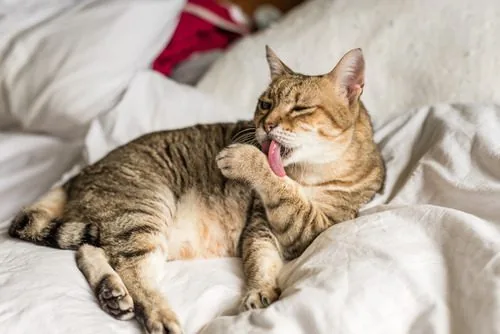Excessive Licking in Cats: Why Do Cats Do This?
Cats are known for their meticulous grooming habits, often spending a significant portion of their day licking their fur. While this behavior is perfectly normal, there are times when it becomes excessive, raising concerns for many cat owners. If you’ve noticed your cat engaging in more licking than usual, you might wonder what’s behind this behavior and whether it’s something that needs attention. Let’s explore the reasons behind excessive licking in cats and what it could mean for your feline friend.

What Is Normal Grooming Behavior in Cats?
Cats are naturally clean animals, and grooming is a part of their daily routine. This behavior not only keeps their fur clean but also helps regulate body temperature, remove parasites, and strengthen their bond with other cats. Grooming also provides cats with a sense of comfort and security, which is why they often engage in licking when they are relaxed. However, it’s important to distinguish between normal grooming and excessive licking. A cat that is excessively licking may be signaling that something is off.
Potential Causes of Excessive Licking in Cats
When a cat’s licking behavior becomes excessive, it’s often a sign that something is amiss. Here are some common reasons why your cat might be licking more than usual:
Allergies and Skin Irritations
Cats can develop allergies to various environmental factors, such as pollen, dust, or certain cleaning products. Food allergies can also cause itchy skin, leading to increased licking. In some cases, the excessive licking might result in bald patches or sores on the skin, which can further aggravate the problem. Skin irritations, such as flea bites or contact dermatitis, can also cause cats to lick excessively. Fleas are a common culprit, especially if your cat is allergic to flea saliva. Even a single flea bite can trigger intense itching, leading your cat to lick the affected area repeatedly.
Pain or Discomfort
If your cat has arthritis, an injury, or any other underlying medical condition, it might lick the area that hurts in an attempt to soothe the discomfort. This is similar to how humans might rub an aching muscle. Licking due to pain is often localized to a specific area. For example, if your cat is licking its abdomen excessively, it could indicate discomfort in that region. Similarly, licking around the mouth or face might suggest dental pain or issues with the gums.
Stress and Anxiety
Changes in the household, such as moving to a new home, the arrival of a new pet, or even changes in the owner’s schedule, can cause stress in cats. When a cat is anxious or stressed, it may turn to excessive grooming as a coping mechanism. This behavior, known as psychogenic alopecia, is a condition where a cat over-grooms due to psychological stress. The licking becomes a repetitive, compulsive behavior, and it can lead to significant hair loss and skin damage if not addressed.
Signs of Excessive Licking in Cats
Some indicators that your cat’s licking behavior has become excessive include:
- Bald patches or thinning fur
- Skin sores or redness
- Changes in behavior such as more anxious or restless than usual
- Localized licking
When to Seek Veterinary Care
While some causes of excessive licking might be benign, others can indicate a more serious issue that requires veterinary attention. If you notice your cat licking excessively, monitor their behavior closely and consider making an appointment with your veterinarian at Festival Animal Clinic. Here are some situations where veterinary care is especially important:
- Persistent or worsening symptoms: If the excessive licking persists for more than a few days or if the symptoms worsen, it’s time to consult your vet.
- Physical signs of distress: Licking that results in open sores, bleeding, or significant hair loss should be addressed promptly to prevent secondary infections.
- Behavioral changes: If your cat’s excessive licking is accompanied by changes in appetite, lethargy, or other unusual behaviors, a vet visit is warranted.
How Festival Animal Clinic Can Help
When you bring your cat to Festival Animal Clinic for excessive licking, your vet will likely start with a thorough physical examination. They may ask about any recent changes in your cat’s environment, diet, or behavior to help pinpoint the cause. Depending on the findings, the vet might recommend the following steps:
- Allergy testing: If allergies are suspected, your vet may suggest testing to identify specific allergens.
- Treatment for skin conditions: For skin irritations, your vet might prescribe topical treatments, medications, or a special diet to manage the symptoms.
- Pain management: If pain is the cause of excessive licking, your vet can offer pain relief options, such as medications or physical therapy.
- Behavioral interventions: For stress-related licking, your vet might recommend behavioral therapy, environmental enrichment, or, in some cases, anti-anxiety medications.
Supporting Your Cat’s Well-being at Home
In addition to seeking veterinary care, there are steps you can take at home to support your cat’s well-being and reduce excessive licking. These include:
- Try to keep your cat’s environment as consistent and stress-free as possible. Cats thrive on routine, so maintaining a regular schedule for feeding, playtime, and other activities can help reduce stress.
- Regular flea prevention to avoid flea-related skin irritations that can lead to excessive licking.
- Keeping your cat mentally and physically stimulated can reduce stress and prevent boredom, which can trigger excessive grooming.
- Ensure your cat is on a balanced diet that meets their nutritional needs and addresses any potential food allergies.
Excessive licking in cats is a behavior that shouldn’t be ignored, as it can be a sign of underlying health or behavioral issues. Now that you know about the potential causes and what proactive steps to take, you can help your cat live comfortably and happily should you notice any excessive licking. If you’re concerned about your cat’s licking behavior, contact Festival Animal Clinic at (303) 850-9393.
